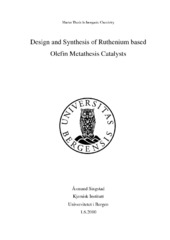Design and Synthesis of Ruthenium based Olefin Metathesis Catalysts
Master thesis
Permanent lenke
https://hdl.handle.net/1956/4032Utgivelsesdato
2010-06-01Metadata
Vis full innførselSamlinger
- Department of Chemistry [433]
Sammendrag
The present Master thesis seeks to develop new unsymmetrical ruthenium-based olefin metathesis catalysts and therein a better understanding of olefin metathesis catalysis with unsymmetrical active complexes. Such catalysts have a potential for chemoselectivity and in best case, stereoselectivity. Two different classes of catalysts, coordinated by a hemilabile amine ligand and by a novel N-heterocyclic carbene (NHC) ligand respectively, have been investigated. Two new amine-based olefin metathesis catalysts have been synthesized and tested. In addition, quantum chemical calculations to study the catalysts were performed to give a better knowledge about their behaviour in catalytic olefin metathesis. Prior to the main calculations a validation study was performed to identify the most accurate and effective method of optimizing geometries. The catalysts are shown to be temperature dependent catalysts (latent catalysts) with high thermal stability, which makes them interesting for some industrial applications. The results from the experiments and the calculations are combined to give a better understanding of the catalyst and their properties. However, the analysis of the results for the amine-based catalysts, suggests a limited potential for E/Z-stereoselectivity. To explore a different potentially stereoselective design, a novel sterically demanding bidentate NHC ligand was synthesized. Unfortunately, any attempt to synthesize a corresponding olefin metathesis failed. Instead, we succeeded to synthesize a novel iridium(I) complex containing the novel bidentate NHC ligand. The iridium complex could have potential for catalytic hydrogenation by further adjustments.
Utgiver
The University of BergenOpphavsrett
The authorCopyright the author. All rights reserved
